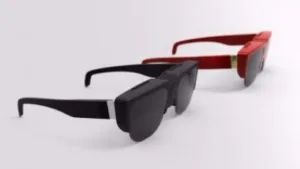LetinAR of Seoul, South Korea, founded in Sept 2016, will show at CES a pair of AR glasses that are claimed to “cause no dizziness even after using them for a long time”.

The company said that humans perceive the distance to the object they see with a comprehensive analysis in the brain, in which the brain takes into account various information such as the two images projected on the retinas, visual angles and the thickness of eye lens. Conventional 3DTV, VR and AR devices can express only fixed distance to a virtual object in 3D, and it induces early fatigue and nausea to the user in a brief period of watching.
The company independently developed ‘Pin-Mirror’ technology, which is said to be capable of showing a sharp virtual object image at a short distance using very small reflectors. While other AR head-mounted display (HMD) devices can only ‘display’ virtual objects over a meter away, the Pin-Mirror Lens enables simultaneous display and ‘interaction’ with sharp virtual objects just 25 cm away from the eyes, “without feeling dizzy”.
The Pin Mirror Lens is also said to provide a wide field of view (FOV) of over 70° in an array (each can currently cover 15°) and a clear expression of full colour without chromatic aberration.
LetinAR CEO Jaehyeok Kim said,
“We currently provide a 1280 x 720 resolution for each eye because of the limitations in micro-display, but users will still enjoy the Pin-Mirror AR comfortably with no decline in quality after the launch of high resolution display, 4K or more.”
LetinAR said that it has succeeded in the injection molding of high refractive index plastic into “ultra-precision” Pin-Mirror Lenses, laying the foundation to mass production for the future AR market.
The company also plans to show its AR smart glasses equipped with Pin-Mirror Lens. The new smart glasses look very similar to ordinary glasses with no protruding lens, and they weigh 99 grams.
LetinAR’s booth at CES is #51115, Tech West, Sands Expo, Level 1, Hall G, Eureka Park
Analyst Comment
I’m not convinced that improving the lenses will reduce ‘dizzyness’, but there is, no question, a a big challenge in AR optics so we’ll try to get along to see this company. (BR)

